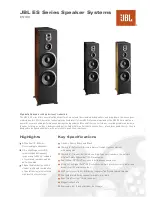
17
Oper
ation
Loudspeaker Phase
Loudspeaker wire has two conductors.
One conductor is attached to the negative
(-) terminals and one conductor is
attached to the positive (+) terminals of
both your loudspeaker and your amplifier.
Usually, the wire is marked for your con-
venience. There are different ways wires
are marked: a stripe on one wire, a ribbed
area of one conductor you can only feel,
different colors of metal wire on each con-
ductor, or there might be a fabric strand or
string wound into one of the conductors.
Of course, there are some wires which
appear completely identical. Be careful, or
you might make a mistake.
If you make a mistake, one loudspeaker
will be playing “out-of-phase” with the
other loudspeaker. An out-of-phase pair of
loudspeakers work against each other and
the sound of the two loudspeakers playing
together will be lacking in bass and be
“phasey” sounding. If you suspect the
sound is not right and you cannot see any
markings on the wire, try this simple test:
1. Stand half way between the loud-
speakers.
2. Play some music with the amplifier
or radio set to Mono.
3. Listen to the richness of the bass and
the loudness of the sound.
4. Turn off the amplifier and reverse the
connections on one amplifier chan-
nel only.
5. Repeat the listening test with the
same setting of the volume control.
When the sound has a richer bass
and is slightly louder the loudspeak-
ers are working together or
“in-phase”.
Operation
Listening at Higher Volumes
It requires more power to achieve a reason-
able volume of sound in a large room than
it does in a small room. It is possible (even if
you are not a teenager) to turn the volume
so high that the amplifier
runs out of power
.
This creates “clipping” distortion.
Clipping distortion makes treble sound
very harsh and unmusical. When you hear
harsh sounding treble from any good
speaker, turn the volume down immedi-
ately! Those harsh sounds are masking
some much more powerful ultra-high-fre-
quency sound spikes which will quickly
damage any fine loudspeaker. You are
much less likely to damage a loudspeaker
with a large amplifier because it will be
very loud indeed before it produces any
clipping distortion.
Cleaning
You can clean the loudspeaker with a
dampened soft cloth or paper towel. If the
speaker is mounted high up on a wall or
ceiling, use a broom to gently brush it off.






































